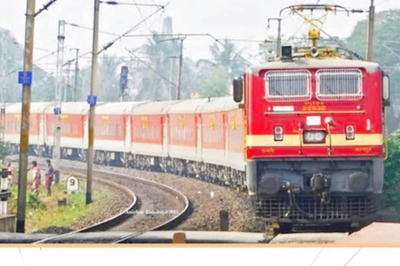
views
New Delhi: The Supreme Court has commenced final hearing in the long-standing Ram Janmabhoomi-Babri Masjid title dispute, a day before the 25th anniversary of the demolition of medieval-era structure.
A specially constituted bench of Chief Justice Dipak Misra and Justices Ashok Bhushan and Abdul Nazeer will hear a total of 13 appeals filed against the 2010 judgment of the Allahabad High Court in four civil suits.
The high court had then ruled a three-way division of the disputed 2.77 acre area at Ayodhya among the parties — the Sunni Waqf Board, the Nirmohi Akhara and the Lord Ram Lalla.
A sect of Muslims, under the banner of Shia Central Waqf Board of Uttar Pradesh, had earlier approached the court offering a solution that a mosque could be built in a Muslim-dominated area at a "reasonable distance" from the disputed site in Ayodhya.
However, its intervention was opposed by the All India Sunni Waqf Board which had claimed that judicial adjudication between the two sects had already been done in 1946 by declaring the mosque, which was demolished on December 6, 1992, as one which belongs to the Sunnis.
Recently a group of civil rights activists also moved the apex court seeking intervention in the Ayodhya dispute and urged it to consider the issue saying it is not just a dispute over property but has several other aspects which would have far-reaching effects on the "secular fabric of the country".
In pursuance to the apex court's earlier direction, the Yogi Adityanath government has submitted English translation of exhibits and documents likely to be relied upon, as these were in eight different languages.
A battery of high profile lawyers, including senior advocates K Parasaran and CS Vaidyanathan and advocate Saurabh Shamsheri, will appear for Lord Ram Lalla, the deity, and Additional Solicitor General Tushar Mehta will represent the Uttar Pradesh government.
Senior advocates Kapil Sibal, Anoop George Chaudhari, Rajeev Dhavan and Sushil Jain will represent other parties including All India Sunni Waqf Board and Nirmohi Akhara.
BJP leader Subramanian Swamy, an intervenor in the matter, had attempted to raise the issue of fundamental right of religion of the Hindus under Article 25 of the Constitution.
Many of the original plantiffs and defendants in the matter, including Mohd Hashim, who was the first person to take the matter to the apex court, have died.
A three-judge bench of the Allahabad High Hourt, in a 2:1 majority ruling, had said the land be partitioned equally among three parties — the Sunni Waqf Board, the Nirmohi Akhara and Ram Lalla.
Here’s a look at how the case has panned out so far:
1949: Idols of Ram Lalla are placed surreptitiously under the central dome of the Babri Mosque
1950: Lawyer Gopal Visharad files first suit in Faizabad civil court for rights to offer prayers to Ram Lalla
1950: Paramhansa Ramachandra Das files a suit for continuation of prayers and keeping idols in the structure
1959: Nirmohi Akhara files third suit, seeking direction to hand over charge of the disputed site.
1961: Sunni Central Waqf Board files fourth suit
1986: District judge orders locks be removed. Site opened for Hindu worshippers
1989: Pending suits are transferred to the High Court
1991: UP government acquires land around the structure for convenience of devotees who attend Ram Lalla darshan
1992: Babri Mosque is demolished by kar sevaks
1993: Government takes over 67 acres of land around the area, seeks apex court opinion on whether a Hindu place of worship existed there before the structure was built
1994: Case goes back to Lucknow bench of HC, suits heard again from 1996
2003: The Allahabad HC orders a survey to find out whether a temple existed on the site. ASI excavations claim features of a 10th century temple
2010: HC rules that the land be divided into three parts —1/3rd going to the Hindu Mahasabha, 1/3rd to Sunni Waqf Board and 1/3rd to Nirmohi Akhara. Mahasabha and Sunni Waqf Board move SC, challenging the HC verdict
2011: Dubbing it as “strange", SC stays the Allahabad HC order. None of the parties had demanded partition of the land, it says
2015: VHP announces a nationwide drive to collect stones for building Ram Temple
2016: Subramanian Swamy says he hopes the construction would begin before year-end
March 6, 2017: SC hints at reviving criminal conspiracy charges against 13 BJP and other Right-wing leaders in the 1992 Babri Masjid demolition case. The conspiracy charges had been dropped by the special trial court in Lucknow on technical grounds
March 21, 2017: CJI Khehar offers to act as mediator to solve the dispute and advises Swamy that negotiation can solve this ‘sensitive issue’
April 19: SC restores conspiracy charges against BJP leaders, including LK Advani, Murli Manohar Joshi and Uma Bharti
May 31: Special CBI court charges the trio with criminal conspiracy
July 21: After Swamy mentions the matter again for urgent hearing before the SC, Khehar says the court will take an early decision
August 8: Shia Central Waqf Board files 30-page affidavit in court, taking back its claim on the disputed land and offering to settle for a mosque in a nearby Muslim-dominated area
August 11: SC bench headed by CJI-designate Dipak Misra begins hearing the matter
















Comments
0 comment